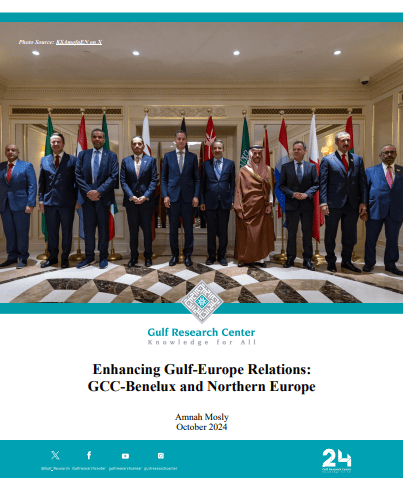
As the Gulf region continues to gain more prominence in global diplomacy, the Gulf Cooperation Council (GCC), both as a bloc and through its member states, has balanced its foreign policy by strengthening relations with its traditional Western partners while at the same time enhancing ties with other allies. This diplomatic approach reflects the evolving geopolitical dynamics of the region, with the GCC actively seeking to diversify its international relations and solidify its role as a player on both regional and global stages.
One development in this regard is the GCC’s further engagement in its partnership with the European Union (EU). The GCC-EU relationship has notably improved following the release of the EU’s Joint Communication on a “Strategic Partnership with the Gulf,” which was approved by the EU Council of Ministers in June 2022. This framework marked a pivotal step in formalizing the EU’s commitment to a deeper partnership with the Gulf, addressing economic, security, and environmental concerns.
Many of the initiatives outlined in the document have already been implemented, signaling both parties’ commitment to strengthening their strategic relationship. Among these achievements, the appointment of Luigi Di Maio as the first EU Special Representative for the Gulf Region in June 2023 represents a dedicated European effort to maintain close and consistent dialogue with the GCC. Other key milestones include the first structured GCC-EU Regional Security Dialogue which was held in Riyadh in January 2024 and demonstrated a joint commitment to addressing regional security concerns, the GCC-EU High-Level Forum held in Luxembourg in April 2024, the inauguration of the GCC-EU Chamber of Commerce in Saudi Arabia in May 2024, and the first-ever GCC-EU Summit in Brussels in October 2024, where both sides discussed a comprehensive vision for future cooperation.
While the GCC sees the EU as the core of outreach with Europe, it is also engaging in other ways with European countries through several sub-regional approaches, such as the Benelux and Northern European countries. On the sidelines of the 79th session of the United Nations General Assembly in New York, joint ministerial meetings, chaired by H.E. Sheikh Mohammed bin Abdulrahman Al Thani, Prime Minister and Minister of Foreign Affairs of Qatar, who is currently presiding over the ministerial council, were held with both of these groupings.
On the one hand, the historical relationship between the GCC and the Benelux countries, which are comprised of Belgium, the Netherlands, and Luxembourg, has, until now, been primarily centered on energy. The Benelux region has long depended on oil and gas imports from the Gulf, with the Netherlands playing a particularly important role in refining and trading oil from the Gulf states. Moreover, Belgium’s port of Antwerp serves as a critical gateway for energy supplies and petrochemical trade between Europe and the Middle East, cementing the economic interdependence of these regions. Over time, this relationship has expanded into the realms of energy and sustainability, technology and infrastructure, and sports, demonstrating a more multifaceted and resilient partnership. For instance, in the sustainability and energy transition fields, a Belgian-Luxembourg delegation visited the Saline Water Conversion Corporation (SWCC) in Riyadh in March 2022 to discuss cooperation in green technologies such as hydrogen production, carbon emissions reduction, and brine mining. Saudi Arabia and the Netherlands have held discussions on the issue of food security, with the Netherlands featuring over thirty Dutch companies at the 41st Saudi Agriculture Exhibition, which was held in Riyadh in October 2024, the largest pavilion of all countries in attendance. In addition, the two countries have signed twelve agreements worth over €200 million, from pioneering advanced agriculture to smart water management.
Saudi Arabia and Belgium have also cooperated in infrastructure. The Saudi Power Transformers Company (SPTC) for instance, is the leading power transformer manufacturer in Saudi Arabia and the GCC. It was established in 2010 as a joint venture between Saudi Transformers Co. Ltd. and CG Power Systems-Belgium (formerly known as Pauwels-Belgium). In addition, Saudi Aramco has selected Belgian contractor Besix Group to work with Saudi-based AlBawani in building the 47,000 spectator capacity Aramco Stadium in Dammam by 2026, in time to host the 2027 Asian Football Confederation Cup. Saudi Arabia and the Netherlands are also exploring cooperation in the sports sector, especially in youth development, women’s football, and technological improvements in football, following a meeting in August 2024 between H.E. Yasser bin Hassan Al-Misehal, President of the Saudi Arabian Football Federation (SAFF), and H.E. Ambassador Hans Peter van der Woude, Ambassador of the Kingdom of the Netherlands to the Kingdom of Saudi Arabia.
Other developments in GCC-Benelux relations include the Sharjah Business Women Council (SBWC) forging a partnership agreement in September 2024 with the European Women’s Association (EWA) in Brussels to “facilitate the exchange of best practices, promote bilateral investments, and organize joint events in Belgium and across Europe.” The UAE and the Netherlands are also cooperating on food security, as evident in the Gulfood Green event held in September 2024 in Dubai, and Oman and the Dutch energy infrastructure company Gasunie are cooperating on green hydrogen development.
On the other hand, the meeting between the GCC and Nordic countries (Denmark, Finland, Iceland, Norway, and Sweden) also held at the sidelines of the UNGA similarly highlighted the Gulf’s importance to Northern Europe and vice versa. This first joint ministerial meeting marked a new phase of engagement, with both sides expressing interest in broadening their collaboration across a range of sectors. Not only does economic data indicate a steady increase in trade volumes between the GCC and Nordic countries, but there are also recent discussions that indicate a mutual desire to expand relations beyond trade to include security and defense cooperation, investment, cultural exchange, education, environmental issues, and energy collaboration.
The GCC and Denmark have enhanced cooperation in countering extremism, providing maritime security through AGENOR, and construction and technology, particularly following COP28 held in Dubai in November 2023. Finland, on the other hand, focused on sustainability, technology, and education to boost ties with the Gulf. Iceland and the GCC have mainly focused on tourism, culture, and education. In Norway, relations with the GCC were strengthened in the diplomatic domain, especially following Norway\’s proactive involvement in Palestine through its recognition and advocacy for a Palestinian state and co-hosting with Saudi Arabia a meeting in Brussels on a coordinated approach to the recognition of Palestine, ending the war in Gaza, and implementing a two-state solution. Norway and the GCC have also explored partnership opportunities in carbon capture, innovation, and renewable energy. Finally, Sweden and the Gulf have increased cooperation in IT, culture, and eco-tourism. The emphasis on these sectors reflects the shared concerns and goals of the two regions, particularly in areas such as sustainable development and regional stability.
The GCC’s evolving engagement with European partners such as the Benelux and Northern Europe demonstrates its diversified approach to diplomacy and international collaboration. While some may view such a policy as a potentially counterproductive move, the GCC sees these partnerships as complementary rather than contradictory as such approaches enable the GCC to build a broader network of allies that can collectively bolster regional stability. By strengthening these relationships, the GCC is not only deepening its ties with Europe but also enhancing its partnerships sub-regionally thereby leveraging Europe’s strengths in fields such as green technology, education, and cultural exchange while also contributing to joint regional security efforts. Concerns that this strategy could lead to overextension and conflicting interests that could impede the efficiency of the GCC’s initiatives are therefore unfounded.
*Amnah Mosly is a Researcher at the Gulf Research Center (GRC)

